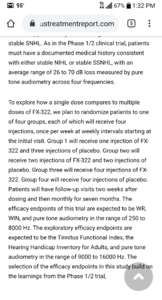Here's the truth.
These types of drugs work. They restore hearing. FACT. Restoring hearing will alleviate tinnitus and hyperacusis PROBABLY FACT. They are also kinda dangerous because they are messing with cellular signalling pathways that can trigger tumors and other stuff. FACT. As long as they don't get into the blood stream then they are okay. FACT. That is why phase 1 was measuring blood plasma levels.
Here's the doom scenario, and I am speaking from experience. An ENT is doing this procedure, and sticks the needle in a little too far and instead of injecting the gel into the middle ear cavity, they inject it into the middle ear epithelium. That will introduce the drug I to the bloodstream. BAD. It can happen. One time Minbo Shim did that to me with PRP, and it hurt so bad that I was cussing him out. It was up there in the most painful things I ever experienced, but that was 1 out of > 100. AND it was PRP so it was okay.
I 100% believe this is a full blown cure for many of us, but success depends on the steady hand of the ENT/Otolaryngologist doing the procedure and it could be the difference between life and death. And it will not be a one time shot, this will undoubtedly require multiple injections.
Make no mistake, this is some high wire medical shit that will require the ENT to be perfect with their hands. Despite the awesomeness of this technology, the major risks might sink this. Hope not.



 Member
Member

